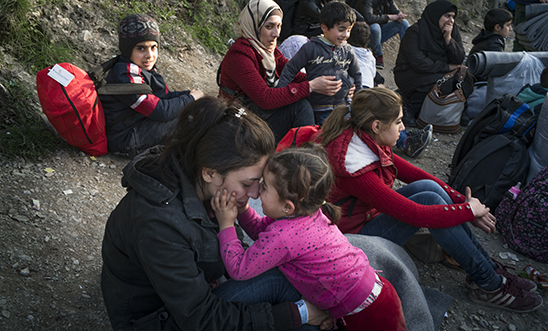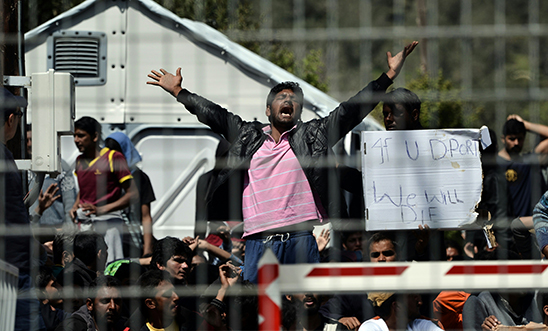Nowhere safe: Refugee women on the Greek islands live in constant fear
Afghan journalist "Shirin" (not her real name) says she was once shot at by the Taliban. But despite fleeing her country to seek safety, she now lives in constant fear in a squalid Greek refugee camp.
'We are treated like animals. I'd rather be shot again than endure these conditions,' she told Amnesty International in the Kara Tepe camp on the island of Lesvos.
Shirin is one of many women who have fled harm and persecution, only to face new fears of sexual harassment and violence in the camps on the Greek islands.
It was 18 months ago that the Taliban shot at Shirin's car. Initially, she fled to Kabul, where she found another journalism job, this time behind the camera.
'It's very dangerous for a woman journalist in Afghanistan,' she said. She continued to receive threats over the phone and eventually it got to be too much for her, and she left Afghanistan for Europe.
'But I don't feel safe here either. I'm so scared, I never leave my room at night,' she said, adding that many of her friends had spoken of cases of verbal and sexual harassment in Lesvos.
Her "room" is a container in which often dozens of women have to sleep on hard floors.
Kara Tepe is considered the "good" camp on Lesvos. Refugees are allowed to come and go as they choose, and it has gender-segregated toilets and showers with doors - simple measures that increase refugee women's feelings of security and may help prevent sexual violence.
'Easy targets'
Conditions are markedly worse in Moria, the until-recently closed camp on the island, which is run by the military and now houses in excess of 3,000 people.
Jumana, a psychologist working for Humanity Crew, an NGO supporting refugees in Lesvos, told Amnesty International about the particular dangers facing women refugees in Moria.
'Women staying in refugee camps are under a lot of pressure and continue to raise their fear of not feeling safe due to the mixed populations in the camps and the mixing in some cases of men and women in the tents and lack of proper lighting at night,' Jumana said.
A 23-year-old woman who was travelling alone told Jumana how she awoke one night in Moria, terrified to discover that an unknown man had entered her tent.
 Moria camp, Lesvos. Amnesty International/Olga Stefatou
Moria camp, Lesvos. Amnesty International/Olga Stefatou
This year, more than a fifth of refugees and asylum-seeker arrivals in Greece have been women and well over a third have been children, according to the UN. They can't leave until they get appointments with asylum-seeker services in Athens, a process that can be painfully long.
Camps on the Greek islands were initially set up as refugee processing facilities, but following the EU-Turkey deal they were turned into prison-like detention centres.
While the authorities have relaxed restrictions on the movement of people in and out of the camps, thousands are still crammed together in tents and containers, food, including baby milk, is often scarce, and shower and toilet facilities unhygienic.
In an attempt to stem the flow of refugees to Greece, the EU has struck a "refugee-swap" deal with Turkey. Refugees arriving in Greece by boat are now at risk of being sent back to Turkey without a proper determination of their asylum claim.
Amnesty International strongly opposes the deal as Turkey does not offer refugees full rights and protections.
'Men fight and we run'
But the Greek island facilities are still struggling, overwhelmed and under-resourced. The lack of food, facilities and tensions due to the conditions and lack of information have led to outbreaks of violence.
In one of the worst such examples, overnight on 1-2 June, a serious fight broke out between some of those detained in Moria and a large area of the camp was set alight. Women and men, including families with young children, had to flee and spend the night in nearby fields or the town of Mytilene, several kilometres away.
Many returned only to find that the fire had destroyed their tents and the few belongings they had.
 A protest inside Moria detention center against deportation to Turkey. AFP/Getty Images
A protest inside Moria detention center against deportation to Turkey. AFP/Getty Images
Unprotected and afraid
Women and men alike told Amnesty International that they often don't feel safe in the camps. Fights break out in the food queues and the police do little to protect anyone.
The Greek authorities must do much more for everyone's safety in the camps.
'Men get drunk and there is no safety. Police will never protect us or intervene. We are also scared that something may happen to our children,' a 23-year-old Syrian woman with three young children said.
A 29-year-old Iraqi woman stuck in the Kara Tepe camp with her three children is trying to reach her husband, who has made it to Germany.
'The other night a man simply opened the door and tried to come into our room,' she said.
Another woman with a six-month-old baby said they were too scared to even use the toilet at night.
'We stay in groups and only go to sleep when we are really tired. In the night, we don't leave our tents and our children are forced to go to the toilet inside,' she said.
One of the most notorious camps in Greece is known as VIAL, on the island of Chios. There, too, fights often break out.
'Men fight and we run and hide. The police just laugh and refuse to help,' a woman there told Amnesty International.
Life in the camps has become an additional misery for those who have suffered torture or who carry fragments of bullets or shelling in their body.
Nearly everyone here has lost someone they loved in a conflict. And it is often the women and girls who feel responsible for caring for others.
A teenage Afghan girl approached Amnesty in the VIAL camp, and said: 'I am 16 and I'm here with my younger brother and my mother, who is blind. How I am supposed to look after them in here?'
Fear, desperation, lack of information and awful conditions are among the underlying causes of the tension and the real risks faced by Shirin, and thousands of other women, men and children now trapped on the Greek islands after the EU-Turkey agreement.
Greece and its EU partners are responsible for this suffering. Instead of dehumanizing these people desperately seeking safety and a better life, it's time Europe offered them protection.
Take action: call on your MP to do more for refugees
Written by Giorgos Kosmopoulos, Researcher on Refugee and Migrants' Rights at Amnesty International. This article was first published on newsdeeply.com.
Our blogs are written by Amnesty International staff, volunteers and other interested individuals, to encourage debate around human rights issues. They do not necessarily represent the views of Amnesty International.
0 comments